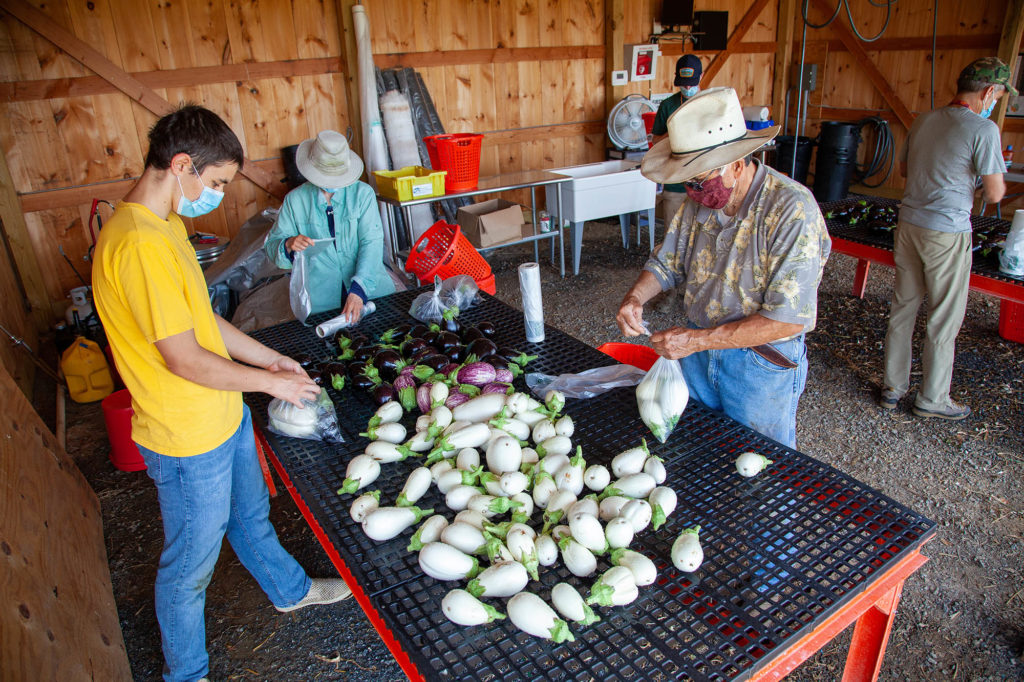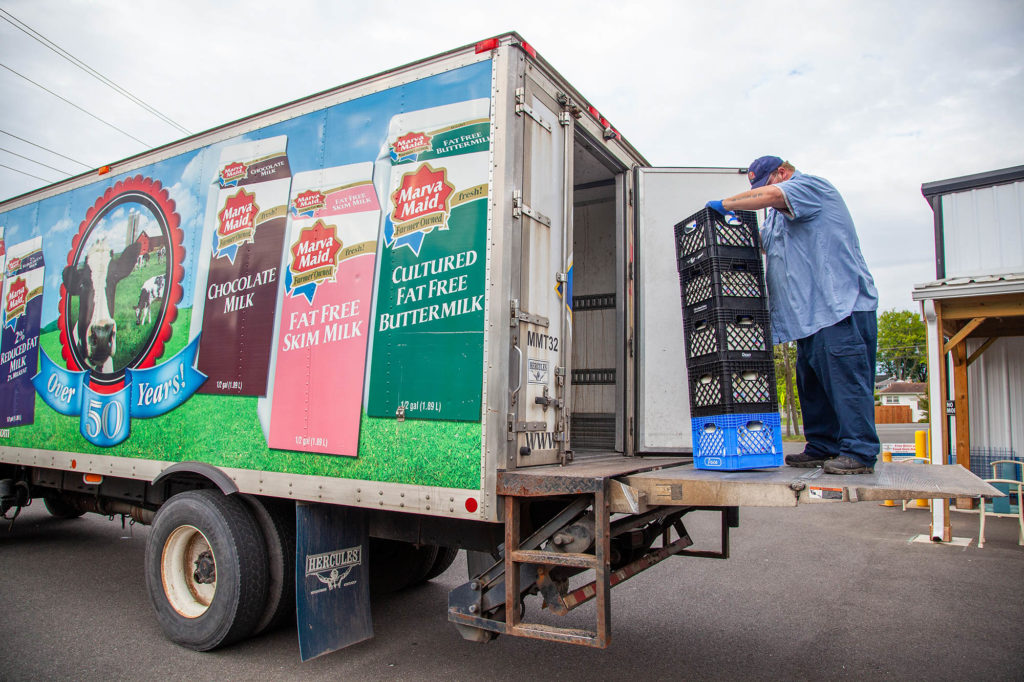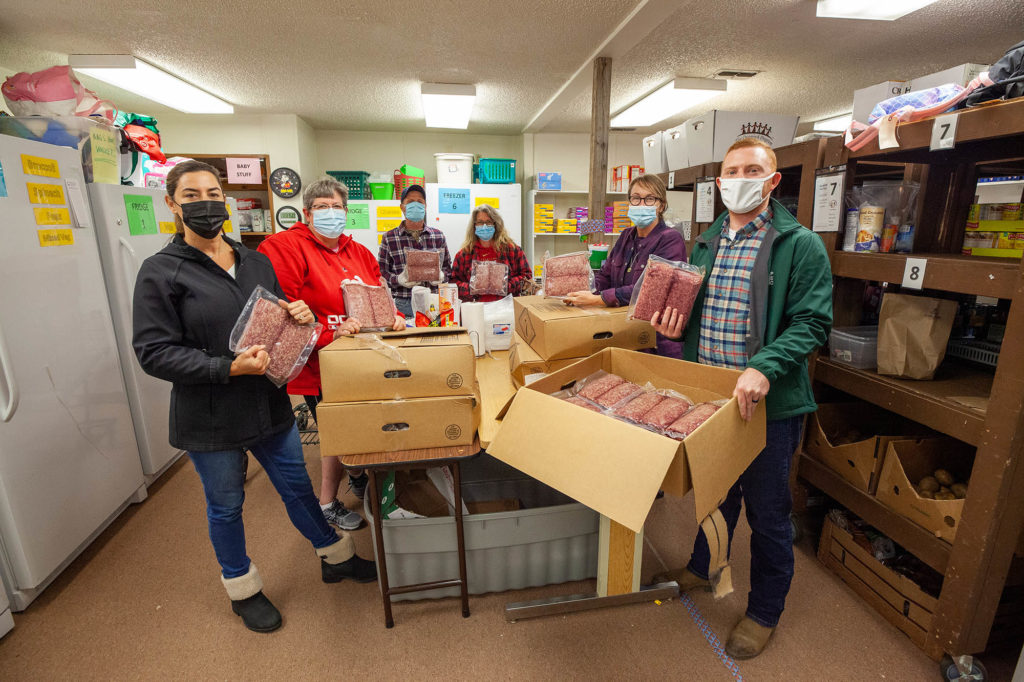Since March, with the help of partners and supporters, The Piedmont Environmental Council has provided 25,000 pounds of vegetables, 25,000 gallons of milk, and more than 11,000 pounds of local beef and pork to the food-insecure in our nine-county region of the northern Piedmont. That’s more than 50,000 pounds of locally-sourced products for local food banks, which has a very different impact on the local economy than shipping in 50,000 pounds of food from somewhere else.
Year 2 at the Community Farm surpassed all expectations
At PEC’s Community Farm at Roundabout Meadows in Loudoun County, what was initially intended to be a slow and steady increase in production this year turned into something much more, as PEC worked to respond to local impacts of Covid-19.
“We tripled both our production area and our donation goal this year, and despite the limitations the pandemic placed on our ability to host volunteers at the height of the season, 470 volunteers still managed to donate 1,100 hours of service,” said Community Farm Manager Dana Melby. Volunteers came from as far away as Winchester to the west and Washington, D.C. to the east.
Several groups throughout the region brought many hands at a time to work in the fields and the greenhouse wearing masks and keeping safe distances from one another. Among them were Frederick County’s Sherando High School and Chantilly’s Paul VI High School, Corpus Christi Catholic Church from South Riding, the Young Men’s Service League and the National Recreation and Park Association from Ashburn, and Loudoun’s American Heritage Girls and Friends Learning Together. “Our community truly stepped up in support of the farm this year; without their help, we would not have been able to soar past our expanded goals,” Melby said.

In total, the Community Farm engaged with 880 community members through volunteer opportunities, tours, and educational programs, and donated 25,000 pounds of produce to Loudoun Hunger Relief. As we line up our production plans for the coming year, we are focused on increasing the health of our soils, improving crop management, and further refining planting schedules. Melby anticipates that we will harvest at least 35,000 pounds of produce for food-insecure families in 2021.
Volunteer season kicks off again in early February, with seedling plantings in PEC’s Phyllis Mills Wyeth Greenhouse. Planting season begins mid-March and runs through summer. First harvests of the year are expected in early April.
Connecting Local Milk and Local Food Pantries

Not long after the pandemic broke out and many community resources closed, PEC became aware that pandemic-related closures and stay-at-home orders were affecting local dairy farms and local food pantries in unexpected ways.
Most local dairy farmers send their product to the Maryland & Virginia Milk Producers Cooperative Association (MDVA Milk), which processes and distributes the milk in half-pint containers primarily to local schools and other large institutions. When those buyers shut down to the pandemic, dairy farmers couldn’t sell their milk. Meanwhile, food pantries found themselves in greater demand than ever before and unable to keep their refrigerators full.
We’ve told you the story of how we partnered with Cool Lawn Farm, MDVA Milk, and the PATH Foundation to raise philanthropic support to buy milk from the cooperative and donate it to local food banks. Media coverage about that initial dairy distribution to Fauquier Community Food Bank generated waves of additional philanthropic support that opened the doors to get milk to even more food pantries throughout our nine-county region. PEC has raised more than $80,000 from individuals and organizations, including the PATH Foundation, Northern Piedmont Community Foundation, Rappahannock Electric Cooperative and the Sacharuna Foundation
In total, we’ve purchased and provided more than 25,000 gallons of fresh milk to approximately 20,000 families in need, while at the same time supporting 17 local dairy farms in nine counties that are members of MDVA Milk, including Fauquier’s Cool Lawn Farm, the largest in the northern Piedmont; Dogwood Farm, the last remaining dairy farm in Loudoun County, and the fifth-generation Harvue Farms in Clarke County, among others.
Expanding to Beef

As the dairy initiative grew, we learned that ground beef was in short supply as well. We wondered if we could work with local beef farmers in the same way to provide locally produced ground beef to those in need. We piloted a similar beef initiative, thanks to a subsidized rate from Lakota Ranch, and donated 200 pounds of ground beef to the Fauquier Community Food Bank. And then things took off.
“Word got out and we found ourselves with new partners in the beef initiative during the fall months,” PEC’s Local Food Systems Coordinator Matt Coyle said. “With grant funding from American Farmland Trust, processing by Seven Hills Food Co. and delivery by 4P Foods, PEC provided 750 pounds of beef from Locust Dale Cattle Company to four food banks in Fauquier, Orange, Madison and Culpeper counties this fall.”
Now, in an exciting turn of events, Karen Way, owner of Ovoka Farm in Paris, has joined the effort with a longterm commitment to donate 10,000 pounds of ground beef and pork to support food pantries throughout our region.
“Ovoka’s core values focus on sustainable farming practices and extend to ensuring that we as an organization are an active community participant. The obvious area where we can help is providing food to feed the hungry,” said Way, who learned about PEC’s Farm to Food Bank program through her friend and PEC board co-chair Jean Perin.
Ovoka Farm’s first donation—of 2,700 pounds of ground beef and 1,000 pounds of ground pork—went to Loudoun Hunger Relief, Seven Loaves, Tree of Life Ministries, Dulles South Food Pantry, and Christ Church Cares. Later, another 1,600 pounds of Ovoka meat were delivered to Fauquier FISH, Community Touch, Rappahannock Food Pantry, and Fauquier Community Food Bank. The remaining deliveries will be scheduled through the holiday season.
Looking Ahead
Prior to the onset of Covid-19, about 843,000 Virginians lacked access to affordable, healthy food. The pandemic added an estimated 447,000 Virginians to that number. Part of PEC’s core mission since 1972 is protecting working farms, and we’ve been additionally focused on local food systems for the past 15 years. When we saw an opportunity to help meet local food needs during the pandemic, our partners and supporters stepped up with us.
The pandemic has exposed vulnerabilities in our local food supply chain. PEC’s efforts, and many others’ throughout the region, during the pandemic demonstrate the power and possibility of a distributed, diversified, even localized approach. Right here in our own region lies some of the most productive farmland in the nation, and the pandemic has brought local farmers and local consumers together like never before to overcome national food shortages.
This article by Cindy Sabato appeared in The Piedmont Environmental Council’s member newsletter, The Piedmont View. If you’d like to become a PEC member or renew your membership, please visit pecva.org/join.
